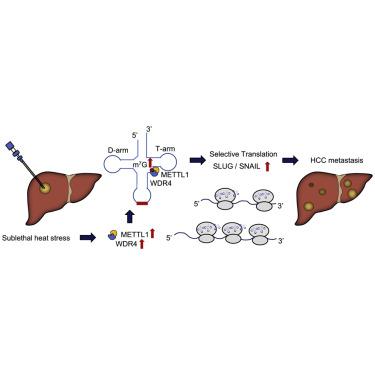Molecular Therapy ( IF 12.1 ) Pub Date : 2022-08-13 , DOI: 10.1016/j.ymthe.2022.08.004 Shenghua Zhu 1 , Yifan Wu 2 , Xinyue Zhang 3 , Sui Peng 4 , Han Xiao 5 , Shuling Chen 5 , Lixia Xu 3 , Tianhong Su 3 , Ming Kuang 6

|
Radiofrequency heat ablation is an ideal radical treatment for hepatocellular carcinoma (HCC). However, insufficient radiofrequency ablation (IRFA) could lead to high recurrence of HCC. N7-methylguanosine (m7G) on tRNAs, an evolutionally conservative modification in mammals and yeast, modulates heat stress responses and tumor progression, while its function in HCC recurrence after IRFA remains unknown. Here, we found that IRFA significantly upregulates the level of m7G tRNA modification and its methyltransferase complex components METTL1/WDR4 in multiple systems including HCC patient-derived xenograft (PDX) mouse, patients’ HCC tissues, sublethal-heat-treated models of HCC cell lines, and organoids. Functionally, gain-/loss-of-function assays showed that METTL1-mediated m7G tRNA modification promotes HCC metastasis under sublethal heat exposure both in vitro and in vivo. Mechanistically, we found that METTL1 and m7G tRNA modification enhance the translation of SLUG/SNAIL in a codon frequency-dependent manner under sublethal heat stress. Overexpression of SLUG/SNAIL rescued the malignant potency of METTL1 knockdown HCC cells after sublethal heat exposure. Our study uncovers the key functions of m7G tRNA modification in heat stress responses and HCC recurrence after IRFA, providing molecular basis for targeting METTL1-m7G-SLUG/SNAIL axis to prevent HCC metastasis after radiofrequency heat ablation treatment.
中文翻译:

射频消融不充分后,靶向 N7-甲基鸟苷 tRNA 修饰可阻断肝细胞癌转移
射频热消融是肝细胞癌(HCC)理想的根治性治疗方法。然而,射频消融 (IRFA) 不足可能导致 HCC 复发率高。 tRNA 上的 N 7 -甲基鸟苷 (m 7 G) 是哺乳动物和酵母中的一种进化保守修饰,可调节热应激反应和肿瘤进展,但其在 IRFA 后 HCC 复发中的作用仍不清楚。在这里,我们发现 IRFA 显着上调多个系统中 m 7 G tRNA 修饰及其甲基转移酶复合物成分 METTL1/WDR4 的水平,包括 HCC 患者来源的异种移植 (PDX) 小鼠、患者 HCC 组织、亚致死热处理模型HCC 细胞系和类器官。从功能上来说,功能获得/功能丧失测定表明,METTL1 介导的 m 7 G tRNA 修饰在体外和体内亚致死热暴露下均促进 HCC 转移。从机制上讲,我们发现 METTL1 和 m 7 G tRNA 修饰在亚致死热应激下以密码子频率依赖性方式增强 SLUG/SNAIL 的翻译。 SLUG/SNAIL 的过度表达可挽救 METTL1 敲低的 HCC 细胞在亚致死热暴露后的恶性潜能。我们的研究揭示了 m 7 G tRNA 修饰在热应激反应和 IRFA 后 HCC 复发中的关键功能,为靶向 METTL1-m 7 G-SLUG/SNAIL 轴以预防射频热消融治疗后 HCC 转移提供分子基础。











































 京公网安备 11010802027423号
京公网安备 11010802027423号